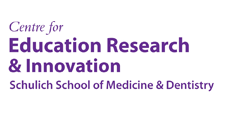Event Title
Comprehensive Geriatric Assessment Guide: An Exploratory Analysis of a Medical Trainee Performance Evaluation Tool
Start Date
5-10-2011 10:45 AM
End Date
5-10-2011 11:45 AM
Abstract
Purpose.
There is little opportunity for medical students and residents to receive feedback on specific geriatric skills as medical trainees are frequently unsupervised when assessing elderly patients. Patients and their caregivers are currently an untapped source for clinical content feedback. The purpose of this study was to determine if patient‐caregiver pairs could accurately complete a post‐assessment evaluation of trainees’ clinical performance and thus serve as a resource to enhance their assessment skills.
Method.
A Comprehensive Geriatric Assessment Guide (CGAG) was developed consisting of 36 yes/no/don’t remember questions prompting the patient‐caregiver to indicate what topics were actually discussed during their assessment. In 2010, two raters independently listened to audio‐recordings of 10 assessments administered by medical trainees and scored the CGAG to determine inter‐rater reliability. Next, 32 patient‐caregiver pairs completed a CGAG after assessment by a medical trainee with their results compared to a gold‐standard CGAG of the encounter.
Results.
Inter‐rater reliability scores for the CGAG were near perfect (94.8% agreement). Thirty out of 36 CGAG questions had patient‐caregiver and gold‐standard agreement of over 80%, while 6 out of 36 questions had low agreement.
Conclusions.
Patients and their caregivers are able to recall sufficient assessment detail to provide constructive feedback to medical trainees on their assessment skills. The six questions with low agreement will be reworded to improve clarity on future versions of the CGAG. Use of CGAG during medical education may help students improve assessment performance and allow educators to track progress in geriatric competencies.
This document is currently not available here.
Comprehensive Geriatric Assessment Guide: An Exploratory Analysis of a Medical Trainee Performance Evaluation Tool
Purpose.
There is little opportunity for medical students and residents to receive feedback on specific geriatric skills as medical trainees are frequently unsupervised when assessing elderly patients. Patients and their caregivers are currently an untapped source for clinical content feedback. The purpose of this study was to determine if patient‐caregiver pairs could accurately complete a post‐assessment evaluation of trainees’ clinical performance and thus serve as a resource to enhance their assessment skills.
Method.
A Comprehensive Geriatric Assessment Guide (CGAG) was developed consisting of 36 yes/no/don’t remember questions prompting the patient‐caregiver to indicate what topics were actually discussed during their assessment. In 2010, two raters independently listened to audio‐recordings of 10 assessments administered by medical trainees and scored the CGAG to determine inter‐rater reliability. Next, 32 patient‐caregiver pairs completed a CGAG after assessment by a medical trainee with their results compared to a gold‐standard CGAG of the encounter.
Results.
Inter‐rater reliability scores for the CGAG were near perfect (94.8% agreement). Thirty out of 36 CGAG questions had patient‐caregiver and gold‐standard agreement of over 80%, while 6 out of 36 questions had low agreement.
Conclusions.
Patients and their caregivers are able to recall sufficient assessment detail to provide constructive feedback to medical trainees on their assessment skills. The six questions with low agreement will be reworded to improve clarity on future versions of the CGAG. Use of CGAG during medical education may help students improve assessment performance and allow educators to track progress in geriatric competencies.
